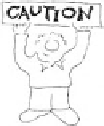Travel Reference
In-Depth Information
At night, this area is becoming increasingly
dangerous for foreign travelers, and you can
expect to be approached when it gets late.
Reports of pickpockets and armed assaults are
on the rise. Take a taxi after dark, even for short
distances, unless you are with a group of people.
In recent years, the state has added “tourism
police” to the streets of this area, but that
provides little assurance unless they are within
sight.
The major embassies and consulates in Quito are listed on pages 45-
47 in the
Travel Information
chapter.
Tourist Offices
The main
Minesterio de Turismo
tourist office (other than the one
at the airport) is at Eloy Alfaro 1214 and Carlos Tobar,
2-2500-719/
/fax 2-2507-564, www.vivecuador.com. The
Provincial
Tourism Office
, Cámara Provincial de Turismo de Pichincha
(CAPTUR), may be even more helpful, at Cordero and Reina Victoria
near the Parque Gabriel Mistral,
2507-555,
2-2551-556. The
South Ameri-
can Explorers Club
is at J. Washington 311 and Plaza Gutiérrez,
/fax 2-2225-228, explorer@seac.org.ec, www.samexplo.org. This is a
great place to track down updated travel information. The
British
Council
, promoting learning opportunities and ideas exchange with
the UK, including a language school and English-Spanish library, is
located on Amazonas and La Niña (near Orellana),
2-2540-225,
british4@uio.satnet.net. Open Monday through Friday. The
US Em-
bassy
in Quito,
/fax 2-
2502-052, is located on the corner of 12 de Octubre and Patria. It's
open Monday through Friday from 8 to 5.
2-2562-890, after-hours,
2-2561-749,
Hospitals
The best hospitals in Quito include
Metropolitano
(Av. Mariana de
Jesús and Av. Occidental;
2-2431-520). This is probably the best
emergency facility, staffed by top professionals, and the costs are
comparable to what you will pay at home. The other is
Hospital Voz
Andes
(Villalengua 267, next to VozVoz Andes radio station,
2-
2241-540). It has an emergency room and is staffed by American,



Search WWH ::

Custom Search